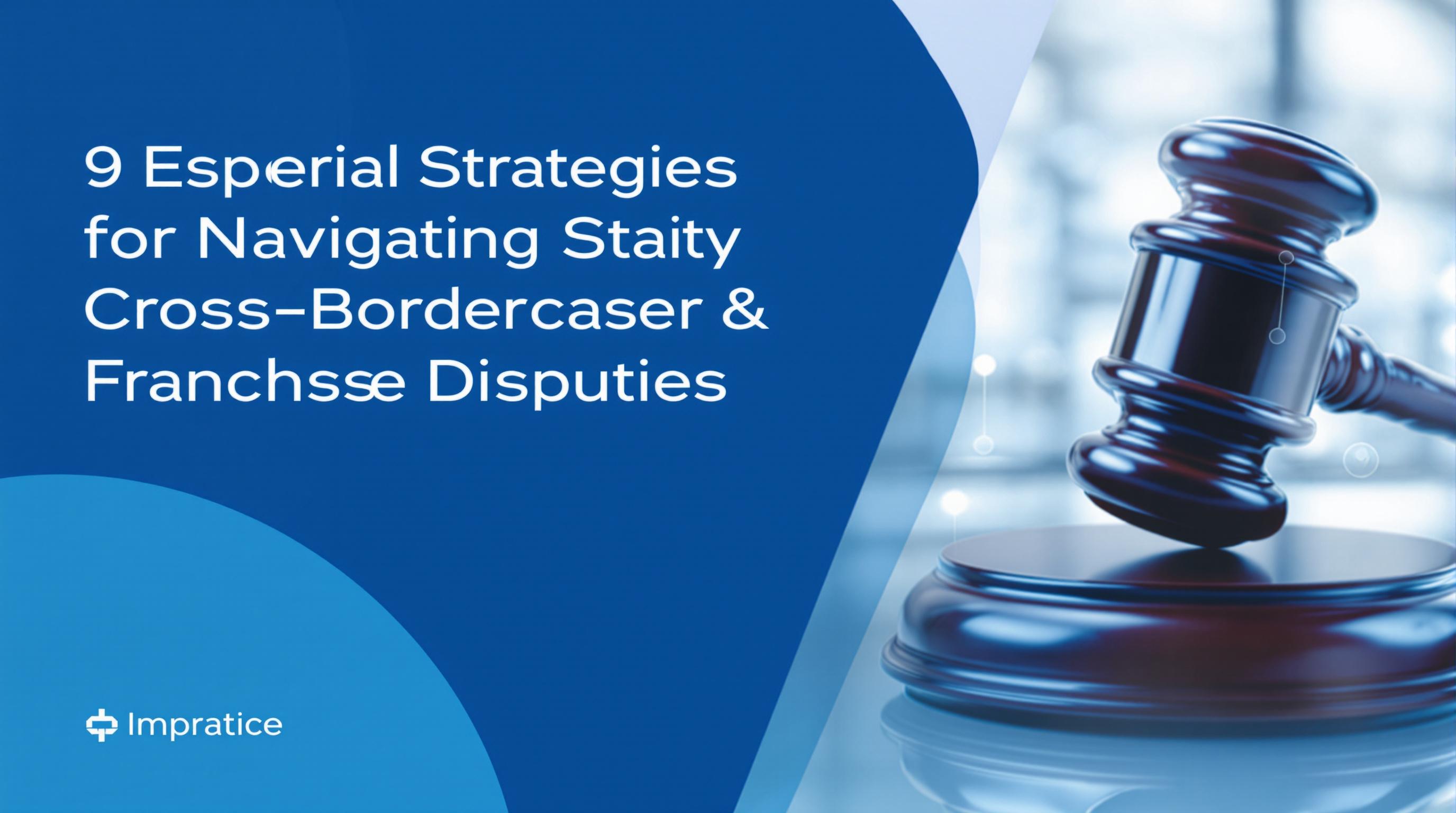Related Articles
- Unraveling the Silent Influence of Biometric Data on European Privacy Safeguards and Compliance Challenges
- Top 6 Game-Changing Franchise Analytics Platforms Launched Since 2019 for Strategic Brand Expansion
- Hidden Pitfalls in Using NDA Templates for Cross-Cultural Tech Collaborations: Lessons from Unexpected Legal Quagmires
- Top 6 Emerging AI-Powered Negotiation Tools Transforming Product Partnership Deals Since 2019
- Top 6 Under-the-Radar Business Licensing Tools Released Since 2019 That Outsmart Traditional Systems
- How Emerging Environmental Regulations Are Secretly Reshaping Small Business Structures in Unexpected Ways
9 Essential Legal Strategies for Navigating Cross-Border Franchise Disputes and Regulatory Challenges
9 Essential Legal Strategies for Navigating Cross-Border Franchise Disputes and Regulatory Challenges
9 Essential Legal Strategies for Navigating Cross-Border Franchise Disputes and Regulatory Challenges
1. Comprehensive Contract Drafting and Review
One of the foundational strategies for managing cross-border franchise disputes is thorough contract drafting and review. Franchise agreements must clearly outline rights, obligations, dispute resolution mechanisms, and applicable jurisdictions. Ambiguities in contracts can lead to costly disputes that could have been avoided with precise language. It is critical to tailor contracts to the specific legal frameworks of the countries involved.
Since laws vary widely between jurisdictions, franchisors and franchisees should engage local legal experts who understand nuances in franchise law, commercial code, and consumer protection regulations. Careful attention should be paid to termination clauses, territorial rights, payment terms, and intellectual property licensing conditions. According to the International Franchise Association, well-structured agreements serve as a key preventative tool in franchise litigation.
Beyond initial drafting, periodic contract reviews help ensure compliance with evolving regulations and business realities. Revisions should occur whenever significant changes arise in regulatory landscapes or business operations. This proactive approach minimizes risks and builds a strong foundation for franchise partnership success across borders.
2. Jurisdiction and Dispute Resolution Clauses
Determining jurisdiction and dispute resolution processes in cross-border franchises is indispensable. Franchise disputes often involve parties from different countries with competing legal systems, making it necessary to establish beforehand which nation’s courts will govern and the preferred method of conflict resolution.
Parties can specify exclusive jurisdiction clauses or opt for arbitration, mediation, or hybrid methods. International arbitration is popular for its neutrality and enforceability under treaties like the 1958 New York Convention. Courts in one country may also decline jurisdiction if an arbitration clause exists, helping avoid jurisdictional conflicts.
Choosing suitable venues and methods reduces the risk of prolonged, expensive litigation and enhances predictability. Companies should carefully negotiate these clauses with local counsel to reflect commercial practice and jurisdictional risk accurately. This strategy is endorsed by global legal experts to help streamline dispute management across borders.
3. Regulatory Compliance and Licensing
Cross-border franchises must navigate multiple regulatory regimes governing business operations, consumer rights, advertising, and intellectual property. Staying compliant with local licensing requirements and industry standards is essential to avoid sanctions or forced discontinuation of operations.
Franchisors should conduct jurisdiction-specific regulatory due diligence early in the expansion process to identify necessary permits, registration obligations, and ongoing reporting duties. Likewise, franchisees must understand local labor laws, tax codes, and corporate governance rules. Failure to comply can lead to fines, damages, or reputational harm.
Engaging regulatory consultants or specialized law firms accelerates compliance and reduces risk. The OECD's guidelines on franchising emphasize transparency and regulatory cooperation as critical drivers of global franchise success. Proactive compliance enables smooth cross-border operations and dispute prevention.
4. Intellectual Property Protection
Intellectual property (IP) rights are a critical asset in franchise businesses, encompassing trademarks, trade secrets, copyrights, and proprietary know-how. Cross-border franchising increases vulnerability to IP infringement due to varying enforcement mechanisms and legal standards in different countries.
Franchisors must ensure their trademarks and IP are registered and enforceable in target jurisdictions before granting franchise rights. Franchise agreements should clearly delineate ownership, use limitations, confidentiality obligations, and procedures for handling infringements.
Monitoring and enforcing IP rights proactively reduces the risk of misappropriation or dilution of brand value. According to the World Intellectual Property Organization (WIPO), effective IP management in franchising can prevent protracted legal disputes and protect competitive advantages worldwide.
5. Due Diligence on Franchise Partners
Thorough due diligence on potential franchisees and local partners is critical to mitigate risks in cross-border franchise agreements. Evaluating financial stability, reputation, operational capacity, and legal history helps identify red flags that could lead to conflicts.
Due diligence should also verify that partners understand local regulatory environments and possess the necessary licenses and permits. This process includes background checks, site visits, and review of prior franchising experience. Transparent communication of expectations early on fosters good faith and collaboration.
Effective screening reduces the potential for disputes rooted in misunderstandings or noncompliance. The International Franchise Association advises rigorous due diligence as a cornerstone of successful and sustainable franchising relationships across borders.
6. Customized Training and Support Programs
Providing franchisees with customized training and ongoing support is not only essential for operational consistency but also a strategic legal safeguard. Proper training reduces inadvertent breaches of contract or regulatory violations by equipping franchisees with knowledge of standards and compliance.
Training programs should address local regulatory requirements, company policies, brand standards, and dispute avoidance mechanisms. Support functions like legal helplines and compliance monitoring enhance early detection of potential issues.
Franchisors that invest in comprehensive training demonstrate diligence in risk management and often find enhanced cooperation from franchisees. Such programs are an effective way to preempt disputes and facilitate timely resolution.
7. Multilingual Documentation and Communication
In cross-border franchises, language barriers can complicate contract understanding and dispute resolution. Preparing multilingual documentation ensures parties fully comprehend their rights and responsibilities.
Translation of contracts, training materials, and regulatory disclosures into local languages minimizes misunderstandings and helps align expectations. Furthermore, providing communication channels staffed by bilingual personnel can facilitate smooth dialogue and problem-solving.
Legal experts recommend that franchisors invest in professional translation and localization services to maintain clarity and avoid disputes born from language differences. Transparent communication builds trust and aids compliance in diverse jurisdictions.
8. Establishing Clear Exit and Termination Procedures
Clear exit and termination provisions help manage conflicts and business changes efficiently in international franchises. Specifying grounds for termination, notice requirements, and post-termination obligations can prevent legal battles.
Clauses should address scenarios such as breach of contract, insolvency, regulatory violations, or mutual agreement to end the relationship. They should also regulate handling of proprietary materials, IP rights, and customer data on termination.
Having well-defined procedures protects both franchisors and franchisees, enhances predictability, and can facilitate amicable dispute resolution. Legal advisors frequently emphasize this aspect as vital to sound franchise governance.
9. Leveraging Technology for Compliance and Monitoring
Technology plays an increasingly important role in managing cross-border franchise legal challenges. Compliance software can track and audit adherence to contractual and regulatory obligations in real-time.
Franchisors can deploy platforms to monitor sales reporting, royalty payments, marketing compliance, and training completion. Data analytics identify trends and flag risks early, enabling proactive intervention.
Utilizing technology streamlines administrative burdens and fosters transparency between partners. Industry analyses highlight digital tools as transformative in reducing franchise disputes and ensuring regulatory compliance globally.




